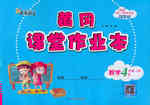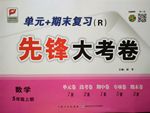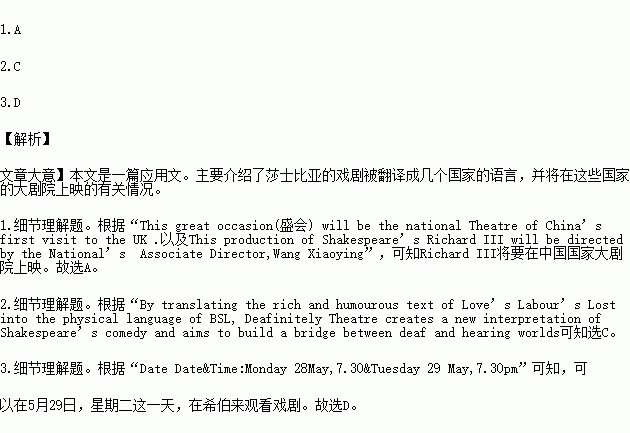题目内容
Passage2(2017·全国新课标II,A)
体裁 | 话题 | 词数 | 难度 | 建议时间 |
应用文 | 友爱 | 273 | ★★☆☆☆ | 6分钟 |
In the coming months, we are bringing together artists from all over the globe, to enjoy speaking Shakespeare’s plays in their own language, in our globe, within the architecture Shakespeare wrote for. please come and join us.
National Theatre Of China Beijing|Chinese
This great occasion(盛会) will be the national Theatre of China’s first visit to the UK. The company’s productions show the new face of 21st century Chinese theatre. This production of Shakespeare’s Richard III will be directed by the National’s Associate Director, Wang Xiaoying.
Date &Time: Saturday 28 April,2.30pm&Sunday 29 April,1.30pm&6.30pm
Marjanishvili Theatre Tbilisi |Georgian
One of the most famous theatres in Georgia, the Marjanishvili, founded in 1928,appears regularly at theatre festivals all over the world. This new production of As You Like It is helmed(指导)by the company’s Artistic Director Levan Tsuladze.
Date & Time : Friday 18May,2.30pm&Saturday 19May,7.30pm
Deafinitely Theatre London | British Sign Language (BSL)
By translating the rich and humourous text of Love’s Labour’s Lost into the physical language of BSL, Deafinitely Theatre creates a new interpretation of Shakespeare’s comedy and aims to build a bridge between deaf and hearing worlds by performing to both groups as one audience.
Date&Time: Tueaday 22 May,2.30pm&Wednesday 23 May,7.30pm
Habima National Theatre Tel Aviv| Hebrew
The Habima is the centre of Hebrew-language theatre worldwide, Founded in Moscow after the 1905 revolution, the company eventually settled in Tel Aviv in the late 1920s,Since 1958,they have been recognized as the national theatre of Israel. This production of Shakespeare’s The Merchant of Venice marks their first visit to the UK.
Date &Time: Monday 28May,7.30&Tuesday 29 May,7.30pm
1.which play will be performed by the National Theatre of China?
A. Richard Ⅲ. B. Lover’s Labour’s Lost.
C.As You Like It. D. The merchant of Venice.
2.What is special about Deafinnitely Theatre?
A. It has two groups of actors.
B. It is the leading theatre in London.
C. It performs plays in BSL.
D. It is good at producing comedies.
3.When can you see a play in Hebrew?
A. On Saturday 28Apil. B. On Sunday 29 April.
C. On Tuesday 22 May. D. On Tuesday 29 May.
 黄冈课堂作业本系列答案
黄冈课堂作业本系列答案 单元加期末复习先锋大考卷系列答案
单元加期末复习先锋大考卷系列答案Passage 3(2017届江西省上高二中高三考)
体裁 | 话题 | 词数 | 难度 | 正确率 |
说明文 | Jake Beckman呼吁出版商应对读者负责 | 361 | ★★★☆☆ |
The Internet is full of headlines that grab your attention with buzzwords (流行词). But often when we click through, we find the content hardly delivers and it wastes our time. We close the page, feeling we’ve been cheated. These types of headlines are called "click bait".
A headline on Businesslnsider.com reads: "This phrase will make you seem more polite". First, when you click through, you find another headline: "Four words to seem more polite." Then, on reading the article, you find it’s actually an essay about sympathy. And what are the four words? They’re "Wow, that sounds hard." On some video websites, you might encounter headlines such as "Here’s what happens when six puppies visited a campus". Turns out it’s just some uninteresting dog footage (镜头).
Nowadays, with the popularity of social media, many news outlets tweet (推送) click bait links to their stories. These tweets take advantage of the curiosity gap or attempt to draw the reader into a story using a question in the headline. These click bait headlines are so annoying that someone is attempting to save people time by exposing news outlet click bait through social media. The Twitter account @SavedYouAClick, run by Jake Beckman, is one such example.
Beckman’s method is to grab tweets linking to a story and retweet them with a click-saving comment. For example, CNET tweeted "So iOS 8 appears to be jailbreakable but...", with a link to its coverage of Apple’s product announcements. Beckman retweeted it with this comment attached: "... it hasn’t been jailbroken yet."
Since founding the account, Beckman’s Twitter experiment has brought him more than 131,000 followers. Beckman said that @SavedYouAClick is…"just my way of trying to help the Internet be less terrible." Asked about his goal, he said, "I’d love to see publishers think about the experience of their readers first. I think there’s an enormous opportunity for publishers to provide readers with informative updates that include links so you can click through and read more.
1.The article on Businesslnsider.com turns out to be___________.
A. useful suggestions on politeness
B.an essay about another topic
C.an article hard to understand
D. a link to a video website
2.Why are readers often cheated by tricky headlines?
A. Social media has become more popular.
B. Readers have questions to be solved.
C. Such headlines are fairly attractive.
D. There’re always stories behind them.
3.Beckman attached his comment to CNET’s tweet to __________.
A. criticize CNET B. save readers’ time
C. advertise apple’s new product D. tell readers something about iOS 8
4.In the last paragraph, Beckman appeals that _________.
A. publishers be more responsible for the link
B. readers think about their needs before reading
C. publishers provide more information for readers
D. people work together to make the Internet less terrible

